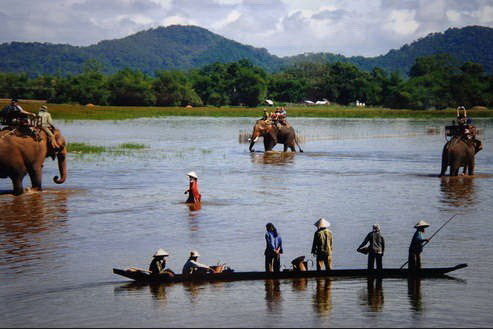
Lak Lake in the Central Highlands province of Dak Lak is where travellers can take a glimpse into the unique cultural life of local ethnic communities, find appetising specialties and experience the fantastic gong culture, which has been recognised as a world cultural heritage by UNESCO.

Lake in the Central Highlands province of Dak Lak
(Photo: VNA)
Situated some 50km from
Buon Ma Thuot city, Lak Lake also boasts its own charms.
In the local M’Nong people’s language, Lak means water. Legend has it that Lak
Lake was born by Lak Lieng, a hero of the M’Nong ethnic people.
The 650ha lake is close to the Krong Ana River, which flows from the 2,500m
high Chu Yang Sin Mountains, and is surrounded by the river on one side and by
mountain ranges on the other three.
To the Lak Lake, visitors can experience the tranquil atmosphere of the
mountains of the Central Highlands.
In the morning the lake looks like a picturesque painting with lotuses in full
bloom, wooden boats and elephants carrying tourists around it.
Jun, M’Lieng and Le villages around the lake are home to the M’Nong ethnic
group, which has preserves its exotic cultural traits and introduced them to
tourists from far and wide.
Visitors to these villages can admire the traditional long houses, enjoy unique
art performances like fire dances and gong performances, ride on the back of elephants
and kayak on the lake.
Source: VNA
Located just a 20-minute drive from Hoa Binh City, Ora Hill Farmstay & Glamping Hoa Binh is a captivating new destination nestled in Mo hamlet, Bình Thanh commune, Cao Phong district. Combining farming with leisure, this tranquil retreat is perfect for those seeking balance, joy, and an immersive experience in the expansive beauty of nature.
Muong Bi - Tan Lac is renowned as one of the four famous Muong regions in Hoa Binh province. Blessed by nature with a favourable climate and stunning landscapes, Tan Lac holds great advantages for tourism development. The local tourism industry has made remarkable strides in recent times thanks to the attention and support from the local authorities and sectors.
With its strategic location, well-developed transport network, and diverse soil and climatic conditions, Hoa Binh is emerging as a must-visit destination in Vietnam's northwestern tourism corridor. The province boasts numerous attractions, including the Kim Boi hot springs (Kim Boi district), the Dau Rong cave complex (Cao Phong), the Mai Chau valley (Mai Chau), and the iconic Hoa Binh hydropower plant.
The northern mountainous province of Hoa Binh has been listed among the 71 most beautiful places to visit worldwide by the prestigious US travel magazine Condé Nast Traveller.
Hoa Binh province’s rich natural and cultural resources position it as a prime location for developing community-based tourism (CBT). In recent years, support from central and provincial policies, as well as assistance from non-governmental organisations, have encouraged local ethnic minority and mountainous communities to actively engage in the sector.



